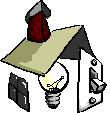Electricity and Electrical Safety:



One of the signs of electrical failure is heat build up (and therefore a potential fire) If a wall switch or wall plug is warm there could be a potential problem. There are many visual signs that can tell you if your house has been non-professionally wired or modified, such as: frayed wires, open electrical boxes, loose or hanging wires, wires joined together with electrical tape, electrical boxes loose in the wall, the electrical panel appearing to have been tampered with and etc..
These are questions you need to ask yourself: Do all your plugs and switches work? Also do all switch plates have covers? Do you see any wires that are frayed or taped together in the crawl space, basement or attic? Are there any loose wires hanging down anywhere even outside over the yard or house? Does your breaker panel have a secure cover that properly shuts? Are there any missing breakers in the breaker panel? Are there open holes in your breaker panel? Is there any uncontrolled water running near or around the electrical panel or plugs or switches? Are all plugs, switches and light fixtures secured? Are there any extension cords that are being used on a "permanent" basis? If you answered yes to a number of these questions you need to have a professional come and make correction. Repairing or replacing electricity plugs, switches and light fixtures should be left up to the experts. Electricity is one of the cheapest areas to have repaired yet one of the most dangerous.
If any of these conditions above exist then call Mr Electricity who is a licensed electrician who we meeting the standards for your municipality.
Safety tips: